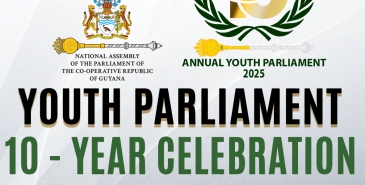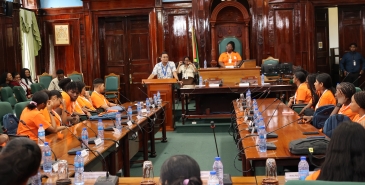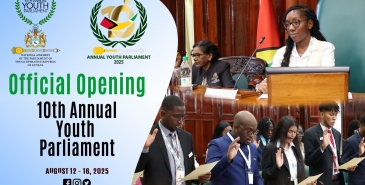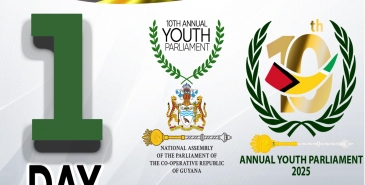Reintroduction of the Berbice River Ferry Service from New Amsterdam to Kwakwani
Speech delivered at: 70th Sitting - Tenth Parliament - 27 February, 2014
27 February, 2014
9232
Lt. Col. (Ret’d) Harmon: Thank you very much, Mr. Speaker. [Mr. Hamilton: Tell us why the boat was removed.] You will hear shortly.
Mr. Speaker, I rise in support of the motion moved by my Colleague, Mr. Trevor Williams, requesting that the House, by resolution, call on the Government of Guyana to restore the ferry service along the Berbice River.
I heard the Hon. Minister give what I would consider to be an open-ended commitment that the ferry service will be reintroduced some time shortly. I would wish to remind the Hon. Minister that this matter came before this very House in 2007 on a question by the People’s National Congress Reform (PNCR) Member of Parliament (MP), Dr. John Austin, who queried whether the Government was going to reintroduce the ferry service to ease the transportation woes of Berbice River residents. The answer which I believe was given, and I see Minister Benn has been credited with a statement on the matter, is:
“…while the service was intended to be a catalyst for both community and economic development within the area, the response was not what was anticipated. He said that on many occasions the vessel would depart New Amsterdam/Stanleytown with a full load of passengers and cargo. However, on the return journey mostly agricultural produce, including wallaba poles and staves were transported as cargo. The service was eventually terminated in 1995…
The service was eventually terminated in 1995, Mr. Benn, not under the PNC. The service was eventually terminated in 1995.
Mr. Benn: Mr. Speaker, on a point of clarification, I did not say that the service was terminated under the PNC. I said that the large vessel, Kimbia, which is an extremely large vessel designed for the Berbice River ferry service, was removed from the river service in the time before the PPP/C came into the Government. I would further clarify that a much smaller vessel called the MV Lukanani was the vessel which was being subsequently used, which service was converted into a private operation in 1995. That is just for clarification.
Lt. Col. (Ret’d) Harmon: Mr. Speaker, the statement I made for my Hon. Friend there was about the termination of the service. Now we hear why it was terminated and when. The service was eventually terminated in 1995 and the MV Lukanani was sold to a private citizen who continued to operate the service until he too encountered economic difficulties. That is the first part.
Secondly, I referred to an article carried in the Kaieteur News on the 8th May. In fact, let me start before that. An article carried in the Stabroek News dated 27th May, 2008 states, “New Amsterdam to Kwakwani Ferry before year end”. The Minister of Transport and Hydraulics, Robeson Benn, quoted that:
“…prior to the resumption of the service of the area inspection of the wharfs along the river will be done to determine what repairs are needed.”
Then, on 8th May, 2009, there was a statement in an edition of the Kaieteur News, under the caption “New Amsterdam to Kwakwani ferry service to return”. The General Manager of the Transport and Harbours Department at that time, Mr. Kevin Trim, reported that the New Amsterdam to Kwakwani ferry service which was terminated nearly two decades ago will be reintroduced shortly. He further echoed that the Lady Northcote assigned to the Transport and Harbours Department was recently taken off the Parika to Bartica route and is to be reassigned to this service at the end of the stint of dry docks for repairs. That was in 2009.
Mr. Speaker, you would understand why I take very little comfort from the assurance given by the Hon. Minister that some time by the end of this year or some time shortly thereafter, we are going to have the reintroduction of the Berbice ferry.
The Berbice River has not just been a place where agricultural produce, the farm produce and so on, are taken to the market. We have people who are living there. Along that route and on to Kwakwani are at least over 2,500 to 3,000 persons who live there. So, while we can say that a route might not be economic for some reason, we have to understand that we have a responsibility to the people of this country to provide a service which is [inaudible] to the benefit of their economic life.
When one removes such an important life blood from a community, one can understand the type of behaviour that my Friend, Trevor Williams, was talking about earlier. We can understand that. When people are forced to eke out a living, it is a different situation.
Mr. Speaker, in the earlier days when the ferry was in operation, there were large swathes of the Berbice River basin and the intermediate savannahs devoted to the effort of crops, including peas, nuts, corns, bananas, plantains, ground provision, pumpkin and cattle. There were large swathes dedicated to that. With the removal of the Berbice Ferry and the subsequent inability of farmers to transport their produce to markets, the economies of these communities such as DeVeldt, Ebini, Kimbia, Sand Hills, Maria Henrietta, Calcuni, Coomacka, Ituni and Kwakwani, were decimated. The experience of seeing huge amounts of their produce of corn, provisions, pumpkin, et cetera, rot as they try to source transportation to a market broke their spirit. [Interruption]
Mr. Speaker: Hon. Members, I need to hear Lt. Col. (Ret’d) Harmon, please.
Lt. Col. (Ret’d) Harmon: It broke the spirit of the farmers and forced them to seek other means of supporting their families. As recent as this morning, I spoke to a resident of Kwakwani, Mrs. Scay Ford, a community worker. She has been living in Kwakwani all of her life. What she said was that since the Berbice ferry was stopped, the major means of transportation from Kwakwani to Linden and to Georgetown was the road, which the Hon. Minister spoke about. There are perils on that road.
Recently, the number of trucks that traverse that road that are involved in international logging has increased. There are in the vicinity of about 30 to 40 trucks traversing that road on a daily basis. These small vehicles that have to traverse the road, competing with those large trucks, present a hazard for those persons who have to come to Linden and to Georgetown. Mr. Speaker, I need not remind you of the several strikes which had to be called due to the condition of that road. There are several minibuses which had to actually stop working to ensure that the road was fixed and put in a certain condition for them to traverse from Kwakwani to Linden. These are matters of recent vintage. So, we need not go back into the history of this matter.
We understand that there is some work that was done on the ferry crossing. The ferry crossing again is another issue because, as I said, they have to compete with the same large trucks. So, there is a serious problem there of getting out of those communities.
Mr. Speaker, I respectfully urge that the Government considers, very seriously, this motion by the Hon. Member, Mr. Trevor Williams, and certainly act on the Resolved Clause of it, that is that this National Assembly immediately calls on the Government of Guyana to restore this service.
The Government has a responsibility. When, because of the action of the state, it puts the lives of residents of a particular community in danger, it goes right back to the days of Walter Rodney’s writing. I wish to refer to a passage in Walter Rodney’s book, How Europe Underdeveloped Africa, page 223. This is what Dr. Rodney said:
“Within any social system, the oppressed find some room to maneuver through their own initiative.”
This is what has been happening to the people up there. They are finding room to manoeuvre. This is what the Hon. Member, Trevor Williams, spoke about - finding ways. You know what it is. You are the Minister of Local Government and Regional Development; you know what goes on in there. The book continues:
“For instance, under the slave regime of America and the West Indies, Africans found ways and means of gaining small advantages. They would flatter and “con” the slavemasters, who were so arrogant and bigoted that they were readily fooled. Similarly, under colonialism many Africans played the game to secure what they could. Africans in positions like interpreters, police and court officials often had their way over the ruling Europeans. However, that should not be mistaken for power or political participation or the exercise of individual freedom. Under slavery, power lay in the hands of the slavemasters: under colonialism, power lay in the hands of the colonialists. The loss of power for the various African states meant a reduction in the freedom of every individual.”
Mr. Speaker, where a government, in my respectful submission, by its own state policy has placed the people at a disadvantage, as in the case here of Kwakwani, Ituni and all those communities along the Berbice River where a state, by its policy, and that is to say by the removal of that ferry, by the various empty promises which were made over the years - 2007, 2008, 2009 and now we are coming to 2014 - which were not kept, we must demand that the Government acts now. In this regard, I commend the motion moved by Member of Parliament Mr. Trevor Williams for the House’s consideration.
I thank you. [Applause]
Speech delivered by:
What's New

17 August, 2025
10th Annual Youth Parliament Closes: Celebrating a Decade of Impact, Excellence, and Youth Empowerment10th Annual Youth Parliament Closes: Celebrating a Decade of Impact, Excellence, and Youth Empower

13 August, 2025
Youth Parliamentarians Assemble for Grand Rehearsals for the 10th Annual Youth Parliament

12 August, 2025
10th Annual Youth Parliament Kicks Off – Young Voices, Bold Ideas, Bright Futures!

11 August, 2025
10th Annual Parliament Kicks off tomorrow

